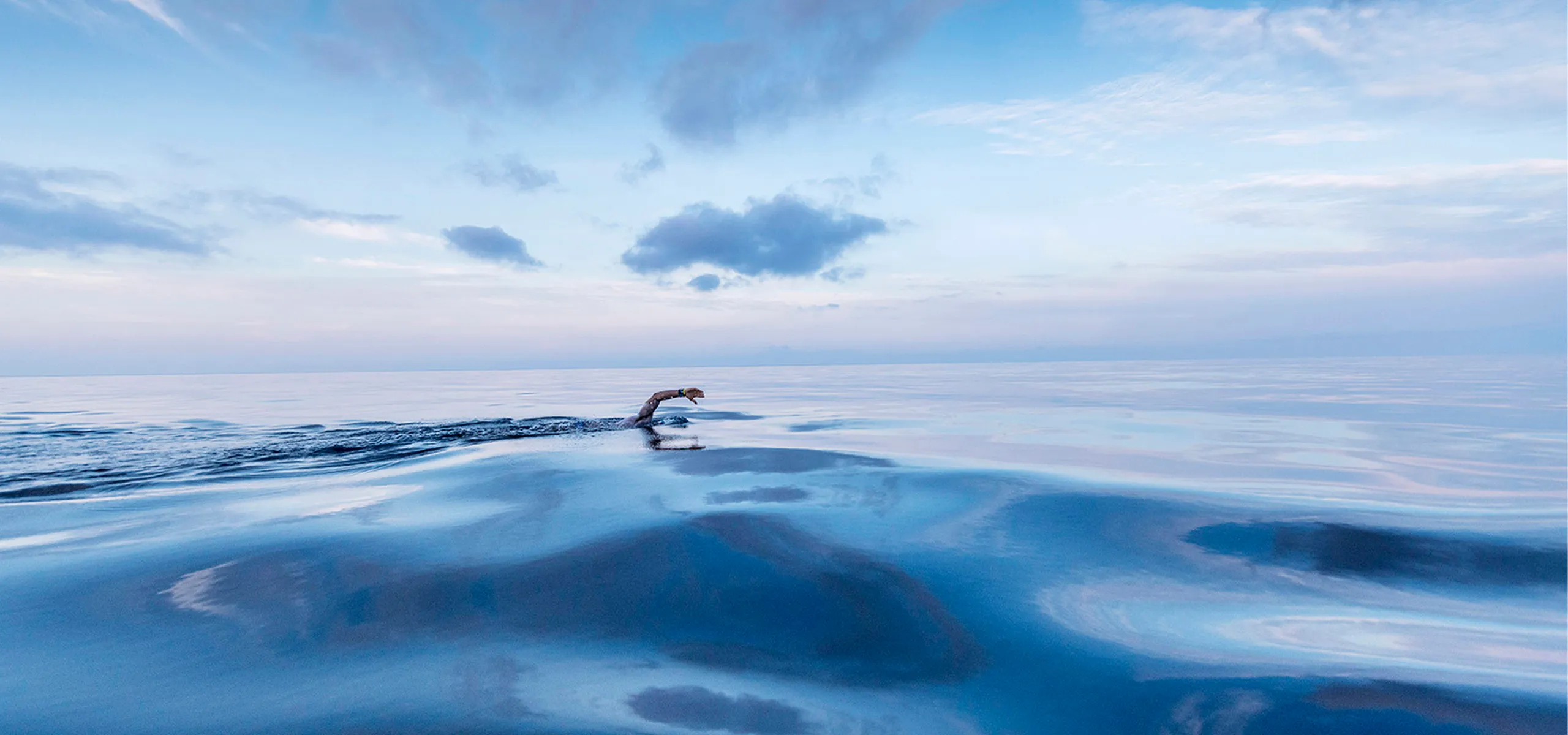Primarily, setting goals and challenges is the first lesson. In life, in business and in sports, if you don’t set yourself a goal, you’re probably going to be wandering aimlessly - and it won’t be long before you realise you haven’t got anywhere worth going.
A few weeks ago I found myself midway up a steep single-track hill nestled in the green woods of Toscolano-Maderno, a quaint little village on the banks of Lake Garda in Italy. I was midway through the trail-run section and the last leg of this Xterra off-road triathlon. I had totally bonked, hit the wall. I needed every ounce of determination, inner strength and hope I could muster if I was to finish.
I was coming to terms with the fact that I had totally overestimated my readiness for this race and underestimated how tough this course actually was. It was a tough pill to swallow. Yet, I was very grateful to have been served this bitter lesson - a sweet reminder of why I take on these challenges. For it’s not what we achieve but who we become after the struggle. And struggle I did.
I had struggled to keep with the middle of the pack in the 1.5km swim section. I totally fumbled the 1135-meter climb on the 30km off-road mountain bike course, though I enjoyed the stunning views and the fast and furious downhills before finally getting into transition to start the final 11km run to the finish.
I ran the first kilometre with ease and power, surprising myself when I actually found my running legs. But, as I reached the foot of the mountain we had to somehow trail across, the voices in my head planted doubts in my mind and anchors in my calves and I quickly settled into a jog. It was not long before the jog became a walk and the walk became a clumsy stagger.
Somehow, at some point, I’m not sure if it was before I felt faint or just after, the thought hit me - life is not very different from triathlon. Definitely fun and satisfying, but challenging to say the least.

1. If you don’t know where you’re going you will probably end up somewhere else.
Primarily, setting goals and challenges is the first lesson. In life, in business and in sports, if you don’t set yourself a goal, you’re probably going to be wandering aimlessly - and it won’t be long before you realise you haven’t got anywhere worth going.
In 2015, along with my colleagues and partners, we sat down and planned BRND WGN’s 2020 vision. Now that we’re months away from the end of 2020, we can safely say that we have celebrated most of those goals proudly. We missed a few, accomplished more than we expected in some areas and learnt a few good lessons along the way. We’re now working on the next 5 years. On a fitness note, I’m also planning my next triathlon goals as we speak. Full Ironman before I’m 50?
2. You lose every race you don’t start.
Goal setting is exciting, but talk is cheap. There are those that can and those that do. And there are a million excuses in business and in sport to delay a start. But start you must if you want to achieve. We all have 24 hours in a day, we all have cash limitations and other valid excuses that get in the way of chasing a business dream, changing career, losing some kilos or running a marathon. The only way to start is to start. And now is as good a time as any. I like to break down my goals into little milestones and focus on putting one foot in front of the other.
3. Consistency is key.
Everything can be trained and perfected through good habit-setting, but you need to put in the work. If you want to achieve, you need to put in the effort. Triathlon races are won in training, they are won through consistency. Luck is when hard work meets opportunity. You need to be mindful of what and when you eat and drink, the quality of sleep and recovery you allow yourself and you need to show up for training consistently. Triathlon training has taught me self-discipline. And that self-discipline has served me well, not only in sports but more-so in business and in life.
That is not to say I have never let my guard down, but I very often regret the times I do. And the more I strive for consistency, the easier it becomes. On a recent work trip, a very successful entrepreneur shared his thoughts about the importance of paranoia in business: it is those that are detail oriented who drive success. Whilst I disagree with using the term ‘paranoia’ loosely, I understand the gist and I definitely subscribe to that point of view. In the business of brand, excellence is also about consistent attention to detail.
4. Endurance is a mindset.
In business we call it resilience, in sports we refer to it as endurance. Both require a positive and strong mindset, one that dictates the battle between the body and the mind when your body wants to stop, but your mind tells it to keep going. We are so often surprised by what we can achieve when we push on through, yet so many of us give up just moments before we reach the finish - only because we can’t see how close we actually are.
Believe achieve - cheesy, stereotypical but nonetheless true. Each hill I climb at stupid-o’clock strengthens my mindset, the self-battering makes me stronger. By the time I hit my desk (typically before most of my colleagues have fallen out of bed), I feel a certain primal roar as I go into my daily battle in business. Sometimes we fall, but it’s getting back up that separates the kids from the adults.

5. The only competition is with yourself.
For me at least, it is. I am aware that I was not born with a champion’s DNA strand. Even if I was, it’s not my objective to ever go professional in sport. My priorities in life are family, friends, business and then sports, but I am conscious of who the enemy is. Every day I strive to be the best version of myself and my only competition is me. In business, it’s not different. All of us can make our organisations better. If we focus on our competitors instead of our customers and our own brand, we lose sight of what success really means. Eyes on the prize, people. Eyes on the prize.
6. Innovation is important but it doesn’t replace hard work.
The only difference between men and boys is the price and size of their toys. Like most weekend warriors, I have collected more running shoes than I need and more ‘allegedly’ technical hacks than I even know how to use. If I spent that downtime stretching instead of reading every triathlon blog or channel on the world-wide-web I would have become a better athlete by now or at least saved myself more cash and injuries.
There have been as many pros who completed and won big races on old second-hand borrowed bikes (like Ironman Champion Chrissy Wellington), as there have been successful businesses which were started on shoe-string budgets (like Airbnb). Nothing replaces hard work. But when you do invest in sports and in business, invest well and wisely. A saving in the short term is typically a big waste of money in the long term and being frugal doesn’t always work. Get the right bike, get the right coach, get the right software and only seek expert advice.
7. Most people will think you’re crazy.
When we started BRND WGN, the competition and the critics thought we wouldn’t last. Our ideas were different, our processes were alien, but our work was better. Thirteen years later we are not about to back down yet. We keep thinking different, we keep trying to improve our process and we still strive for brand excellence. At least now fewer people think we’re crazy.
When I did my first open-water challenge, crossing the Bonifacio Straits to raise money and awareness for the Inspire Foundation charity, many thought I was starting my mid-life crisis. Many questioned if I could manage it and I honestly looked ridiculous in a swimming cap. Today, 5 years later, I’m doing so much more than I thought I could ever accomplish, people still question my sanity and I still look ridiculous, now wearing lycra - the honest truth is I have never been happier, and the more they think I’m crazy the more energy I find to keep going.
8. Stress and pain are not a bad thing.
My osteopath and body mechanics coach, Bryn Kennard (RSPCT señor) insists that pain is not necessarily a sign of damage, it’s typically just a way of your body telling you that you are pushing your current limits - but isn’t that what we are all trying to do?
It is only through overcoming temporary discomfort that we improve and realise how much more we can become. I trust Bryn and his advice, he is one of the people who have contributed to making me stronger and steadier over the years. It’s a shame he has nothing to improve my clumsiness yet (Yes - I still do all my own stunts). Stress in business is not only typical, but expected and I believe we need to be ready to embrace it with open arms if we really want to push our success forward.
If we stop stigmatising the word ‘stress’, we will become better at dealing with it rather than fearing it. Of course, like in sports there is pain and then there is pain, in business there is stress and then there is stress. At BRND WGN we do not tolerate any form of corporate bullying and we do hold the emotional and mental wellbeing of our team very high on the agenda. However, we don’t believe that we do any of our team any long-term favours by over-parenting. Bryn’s theory is to focus on gradual load exposure whereby you push your limits steadily and cautiously - but push you must. At BRND WGN we push our limits steadily with calculated risks, but this challenge-eager attitude is what keeps us ready for the future.
Fundamentally, every path is a journey. And with every journey, it’s not where you get to, but who you become at the end of the road. I would also add that it’s the people you share that path with that make it all the more worthwhile. One of my biggest achievements, beyond the miles I logged and the brands we have supported, is the people I met along the way. They really made the ride a pursuit of happiness. Go the extra mile and make the new connection, treasure the relationships and always be ready to help the next guy change a puncture.

More insights
Scroll for more

Step by Step Guide to Protect Your Social Media Accounts
Always a hot topic, the hacking conversation begins again. Phishing scams and imposter accounts are on the rise, but this time the threat feels much closer to home.


